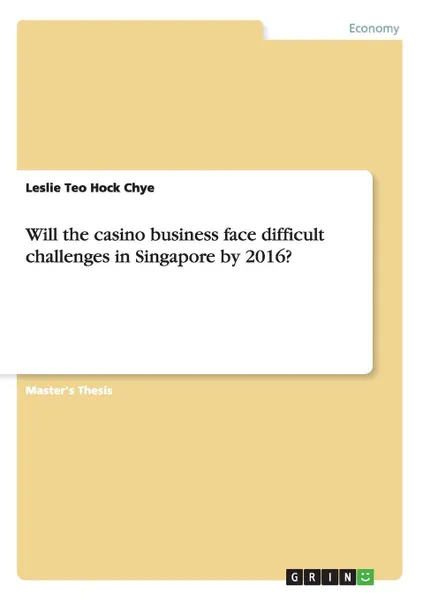Will the casino business face difficult challenges in Singapore by 2016. 12+
Автор: Leslie Teo Hock Chye
66 страниц
Категория: Бизнес образование
ISBN: 9783656739173
Язык: Английский
📕 Master's Thesis from the year 2013 in the subject Business economics - Miscellaneous, grade: B, University of Wolverhampton, course: MBA, language: English, abstract: In 2005, the Singapore government announced to their citizens a proposal to have two casinos in Singapore as part of a project to build two Integrated Resorts with reasons given that the country was losing its competitiveness in the tourism industry and that the country needed to reinvent itself in order to revitalise the economy. Though there were initial objections from within the parliament members as well as some community and religious groups, the controversial project was eventually given the go ahead and in 2010, the two Integrated Resorts with the two casinos were opened, bringing in tourism receipts in the first quarter of 2011 with a jump of more than 35% from 2010. Visitor arrivals rose by almost 16% with sightseeing and entertainment (includes casino gaming) more than tripled.
Using a combination of primary and secondary data as well as exploratory, descriptive and causal research methodologies, this dissertation paper examines Singaporean's perceptions of casino gambling as a tool of economic and tourism development and the government's role in shaping the future of the casino industry in Singapore. In particular, the paper examines whether residents perceive what the Singapore government has promised, that casinos will revitalize their communities by rejuvenating the local economic development, attracting new industries and stimulating tourism growth, or whether the impact has been more negative, resulting in more social repercussions and crimes than the benefits it is supposed to be bringing in. In short, from the Singaporean's perspective, are the casinos taking more out of the community than they contribute to it?
Using a combination of primary and secondary data as well as exploratory, descriptive and causal research methodologies, this dissertation paper examines Singaporean's perceptions of casino gambling as a tool of economic and tourism development and the government's role in shaping the future of the casino industry in Singapore. In particular, the paper examines whether residents perceive what the Singapore government has promised, that casinos will revitalize their communities by rejuvenating the local economic development, attracting new industries and stimulating tourism growth, or whether the impact has been more negative, resulting in more social repercussions and crimes than the benefits it is supposed to be bringing in. In short, from the Singaporean's perspective, are the casinos taking more out of the community than they contribute to it?
Мнения
